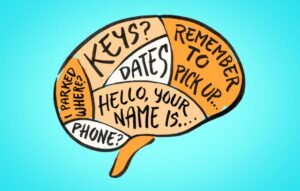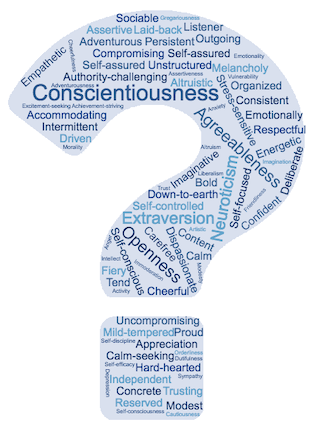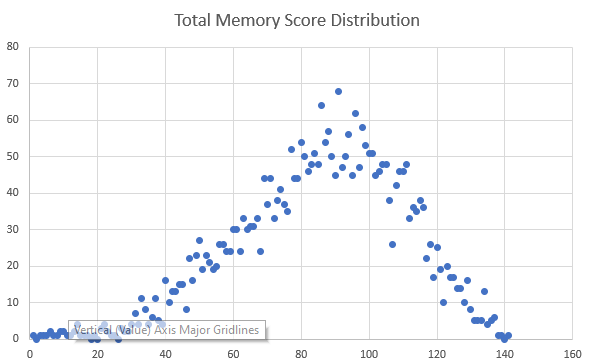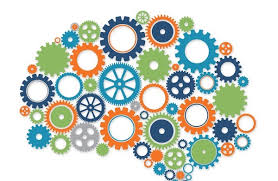Memory Test
Do you have a great memory? Maybe you are the person who remembers every detail about their childhood or can recall all of the lyrics to your favorite song. Then again, maybe not. For those of us plagued with only average memories, there is hope! Memory tests are now more available than ever before and let people who have less-than-stellar memories improve themselves. In this article, we will talk about what memory tests are. We will also discuss how they work and why they could be helpful for improving your digital memory skills.
Contents
What are Memory Tests?

A memory test is a game where you memorize information, then later recall the information. There are many types of games that fall under this category but all have to do with recalling what they should learn at some point in time. Memory tests aim at entertainment purposes or as educational tools! They’re fun and interesting ways to learn new information.
Most Memory Tests are based on the following categories:
- Numbers (i.e., remember numbers in order)
- Colors & Words (i.e., memorize words and colors)
- Shapes & Objects (remember shapes, objects, or images after seeing them once)
A Brief History of Memory Games/Tests
Memory games go as far back as ancient Greece! An ancient Greek rhetorician called Metrodorus created the first memory game around 300 BC! Although there is no record saying anything about how this game actually played out it’s still cool that we have something like that recorded for history! It wasn’t until 1890 when a German psychologist named Hermann Ebbinghaus created the study of memory and how we process new information. Ebbinghaus introduced more scientific techniques to measure human learning and memory, which is still used today!
What are the uses of Memory Tests?
Memory tests can be used for entertainment purposes and as educational tools! They’re fun and interesting ways to learn new information, whether it’s just a few words or numbers. Memory games are also great for brain training! They’re a fun way to exercise your brain and help it work better.
Memory Tests As Educational tools
Memory tests are useful in the classroom! They’re interesting ways for students to learn new information, like vocabulary words or math facts. When you think of memory games/tests they don’t immediately bring education into mind but that’s exactly what they do! You can use them as an incentive if needed; kids love playing games so why not create some really cool ones around learning? Kids often get bored doing worksheets day after day (who wouldn’t?) But making these games based on something like spelling words would make it more enjoyable for students! It keeps their attention longer than just reading out of a boring book or worksheet.
Educational Memory Games/Tests
There are tons of memory games and tests you can create! Here’s a few ideas to get started:
Number Memorization Game
This game is great for younger children, who may not know how to read numbers yet. All they have to do is look at the number once then try and remember it later on in the game! It helps kids learn their numbers by putting them into one big category instead of little bits like letters (one & two) which makes it easier for younger ones to memorize these simple things before moving on to harder concepts. You could even extend this further with other activities such as addition or subtraction problems using those same numbers from above.
Grocery Store Game
This one’s a fun way to learn about healthy foods! Go grocery shopping together and have them pick out all the vegetables they can find. Once you get home, let your little ones sort through what they picked out into separate piles or categories of veggies/fruits that start with each letter of the alphabet (including random items like onions). Then after everyone is done sorting it has them try and remember which category goes in which pile when you’re finished 🙂
Shapes & Colors Game
Young children love learning colors so why not create a memory game around it? All kids need to do in this game is look at an object then recall what color(s) it was later on down the road. It’s a simple way to introduce colors and shapes to young children who might not know how or maybe struggle with this concept at school!
Grammar Game
This is great for older kids, teens, & adults that need help remembering certain grammar concepts as well as sentence structure! The goal of the game is to create sentences by using only one word from each category (i.e., noun/verbs/adjectives) which makes it harder but fun too 🙂 You can make these categories anything you want really; I chose those because they were easy ones for me but there are tons more options out there just waiting to be used!
Fun Memory Games
Memory games don’t have to stop here either! There are tons of other things to use for memory games or tests that can help kids learn. You could do shapes, colors, foods – anything you want! They’re great ways to enhance your child’s learning and give them fun new information they’ll remember better than if it was just read out of a book.
Sample Questions For Memory Test
Here are a few sample questions to get you started:
- What was the number we saw at the store?
- What color is your shirt right now?
- In what row did I see an apple?
- Name one item that starts with the letter B. How many letters does P have in it?
- Did Mrs. Smith say she would come or not?
- Which category has more apples – Fruits or Vegetables?
The list goes on and on; there are tons of ways you can create memory games/tests for kids! It doesn’t even need to be school-related either, maybe during playtime, they’ll remember their favorite game better than something else if it’s fun & interactive like these.
Any way you go about using them (and whatever age group) memory games/tests are great ways to enhance learning for anyone! Kids love having fun and if it’s done in a game format, they’ll remember things better than just reading off of boring worksheets or textbooks that seem like too much work.
Sample Memory Quiz For Beginners

Sometimes I forget what day of the week it is.
- True
- False
Sometimes I forget what I am looking for so it is hard to find it.
- True
- False
I think my friends and family are right. I am more forgetful than I used to be.
- True
- False
I sometimes forget the names of my friends.
- True
- False
It’s hard for me to add two-digit numbers without writing them down.
- True
- False
I forget about the appointments that I have.
- True
- False
I am often tired.
- True
- False
It’s harder to deal with little problems now than it used to be.
- True
- False
It is difficult for me to concentrate.
- True
- False
I often lose my keys. When I find them, I can’t remember where I put them.
- True
- False
I sometimes say the same things.
- True
- False
Sometimes I get lost when I am driving to places that I have been before.
- True
- False
I can sometimes lose sight of my intended message.
- True
- False
I use caffeine to keep my mind nimble.
- True
- False
It takes me longer to learn new things than it used to.
- True
- False
Scoring In A Memory Test

Psychologists grade memory tests on a scale between 0 and 40. For example, you might score 30/40 if your memory is strong or 20/40 if it’s not so good. The average person has an 18 out of 40 (as I said earlier). It shouldn’t be too difficult to beat that! In the end, it’s hardly a test of memory at all, but rather one of how well you know the mnemonic techniques.
A zero score means that you didn’t remember anything, which is not surprising if you haven’t learned any methods yet! If this describes your situation then I suggest going through my list of 20+ Mnemonics for Memorizing Anything.
A score of 15/40 is quite low, but with a little bit of effort, most people can improve their memory to this level. For example, by using my Peg System you’ll be memorizing random digits in no time!
When your score reaches 25 it shows that you have good working memory and are able to remember things for a short while. This is a good foundation to build upon! However, I still recommend learning some memory techniques so that you can remember things for longer periods of time and have more storage space in your working memory.
A score between 30/40 shows that you have an excellent long-term recall ability. In other words, if there’s something you need to remember you can do it with almost 100% accuracy.
If your score is 40/40 then congratulations! You have a photographic memory; however, I don’t expect many people will get this high on such a short test (unless they’ve practiced extensively). If you did manage to achieve this result though please let me know as there will be a prize for the first person to do so!
Results and Predictions of Memory Tests
As I said earlier, memory tests don’t accurately represent an individual’s ability to memorize things. There are several reasons for this:
The scoring system doesn’t take into account the difficulty of what you’re trying to remember (i.e., how many details there were). For example, if you only get a score of 15/20 for memorizing a long list of words then it doesn’t mean that your memory is bad. It just means that the word list wasn’t particularly complicated to remember.
The tests are often time-limited, which can be stressful and affect performance on what you manage to recall in those limited minutes! This isn’t really fair either because some people are just better at memorizing things when they’re under time pressure.
Every memory test I’ve seen uses different types of information (words, images, numbers) which doesn’t give an accurate representation of your ability to remember every type of thing you might need to in real life! For example, if you recall everything correctly during a number-memorization test then it might disappoint you when you can’t remember someone’s phone number a few seconds later.
The scoring system only takes into account the accuracy of your recall, not how quickly it was recalled or whether there were any errors! A score of 38/40 is obviously better than one of 12 but if it took an hour to do and you got things wrong then it doesn’t really matter.
The tests don’t take into account the fact that different people have strengths and weaknesses in certain types of memory (e.g., auditory, visual) which means you might be great at remembering words but not so good when it comes to images.
Conclusion
Memory is not as reliable as we think it is. Many factors influence such as stress, lack of sleep, and the environment you are in at the time. The good news? You can improve your short-term memory with a few simple steps. Here’s how to remember more facts and figures (and maybe even some long-forgotten memories) for longer periods of time:
- Take care of yourself – Make sure you’re getting enough rest and exercise every day;
- Create connections between what you want to memorize and other things that grab your attention or interest: This will make remembering easier because those new associations help recall information faster when needed;
- Practice regularly (and I don’t mean cramming the night before an exam);
- Organize your thoughts – Keep a diary or planner and write down what you want to remember so that when you actually need it, it’s there in front of you;
- If all else fails, spending some time on brain training can help strengthen your memory and improve your recall.
If you are looking for affordable Online Counseling MantraCare can help: Book a trial therapy session


